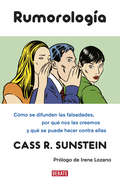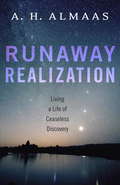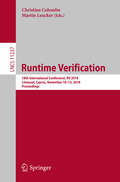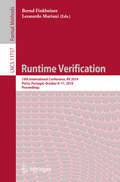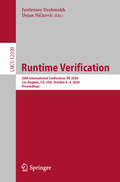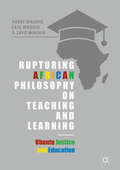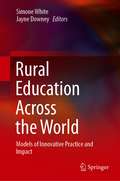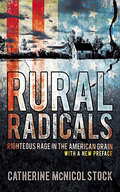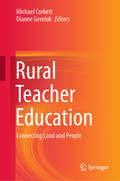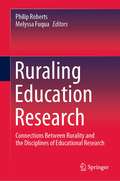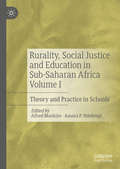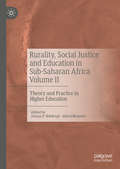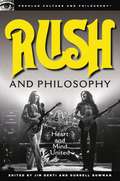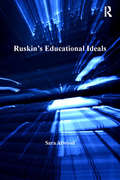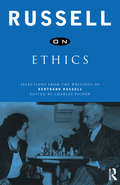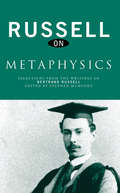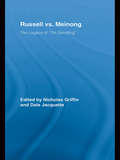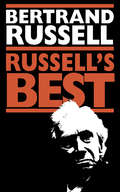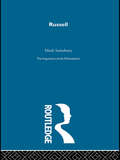- Table View
- List View
Rumbles of Thunder: Power Shifts and the Danger of Sino-American War
by Steve ChanIt is widely believed that shifts in the balance of power between an established hegemon and a rising upstart can lead to war. To what extent does this proposition hold true for Sino-American relations today?Steve Chan examines a range of international relations theories and popular narratives that suggest an elevated risk of confrontation between the two powers. Probing the recent deterioration in Sino-American relations, he considers whether several factors that can raise or lower international tension apply to the current situation. Chan demonstrates that power shifts do not preordain violent outcomes—nor does their absence ensure peace. Criticizing overly mechanistic frameworks, he emphasizes that domestic politics, international political economy, and the choices of individual leaders are all crucial to understanding why wars happen.Chan demonstrates that claims of a “rising China” catching up to and even poised to overtake the United States are alarmist: American structural advantages will endure for some time to come. Contrary to prevailing narratives, China does not act like a revisionist power seeking to overturn the system, while the United States, far from defending the international order, has frequently undermined it. However, Chan cautions, Taiwan remains a flashpoint for a possible Sino-American conflict. Bringing together expertise in IR theory and keen political acumen, Rumbles of Thunder challenges conventional wisdom on the likelihood of war between the United States and China.
Rumi: A Journey to Healing the Heart
by Kamla K KapurRetold in award-winning writer Kamla K. Kapur&’s elegant, flowing language, Rumi&’s tales of wisdom and humanity are given fresh life in this modern masterpiece.Rumi: Tales of the Spirit is a sweet, comforting, and at times, fiery guide to nourishing the spirit. In a hopeful but pragmatic tone, timeless storyteller Rumi and award-winning author and playwright Kamla Kapur guide us through the trials of life and teach us to embrace suffering, to pray even when it feels hopeless, and ultimately, to surrender to the cosmic will. In twelve fresh and powerful tales of wisdom, we learn to trust in ourselves and in the universe, experience joy in good times and bad, and find the strength to persevere through life&’s struggles. Kapur has been studying Rumi for twenty years. Through her detailed analysis of his life and work and her own understanding of the human condition and the present-day literary scene, Kapur brings new life to these centuries-old stories while staying true to their roots in Rumi&’s time and place. These retellings convey Rumi&’s deep insight on the human condition and bring to light the vast and subtle meanings of his stories that are often lost in translation. Through this work, we see that people around the world and across time have always been connected by the hopes, dreams, and inner struggles that make up the human experience. Personal, poignant, and woven with fierce passion for life and the divine, Rumi: Tales of the Spirit will leave you with heart-wrenching gratitude for life&’s trials and gifts.
Rumorología
by Cass R. Sunstein¿Por qué los seres humanos aceptan los rumores, incluso si son falsos, destructivos o estrambóticos? ¿Por qué la misma historia que viaja por Internet tiene credibilidad entre un grupo de personas, mientras que otros la consideran absurda? ¿Qué podemos hacer para protegernos de los efectos perniciosos de los rumores falsos?Los rumores son tan antiguos como la historia humana; siempre hemos vivido rodeados de ellos o incluso sufrido sus consecuencias. Del mismo modo que a través del conocimiento de otros sabemos que la tierra no es plana o que la materia se compone de átomos, los rumores se propagan entre todo tipo de personas --sensatas, razonables, de izquierdas o derechas---, y están ligados a sus deseos y temores.El derecho de los ciudadanos a decir lo que piensan constituye uno de los pilares de los sistemas democráticos en que vivimos, y sin embargo, en la era de Internet, donde uno de estos bulos puede crecer exponencialmente en tan solo unas horas, es fundamental proteger a las posibles víctimas de comportamientos maldicientes. Ayudado por ejemplos de la vida real y estudios de la conducta, Sunstein aborda la compleja tarea de analizar los mecanismos que alimentan los rumores para tratar de encontrar ese equilibrio indispensable entre la necesidad de protegernos de ellos y la salvaguarda de derechos como la libertad de prensa y opinión, y así evitar que la era de la información termine convirtiéndose en la era de la desinformación.
Rumors (Theory Redux)
by Mladen DolarWhen Socrates was standing before the Athenian tribunal in 399 BC, he said in his defence that the opponents he feared most were the invisible ones, those who had been spreading rumors against him for years but none of whom were being brought to court – it was like fighting shadows. The moment was iconic: Socrates, the harbinger of logos and true knowledge, was eventually defeated by rumors and mendacious slander. Where does the strange power of rumors come from? Everyone knows that rumors are unfounded and based on thin air, but still they pass them on: rumors spread, and what appeared as a small breeze can grow into a mighty whirlwind and produce serious effects, ruin people’s lives and change the course of events. This book scrutinizes the mysterious power of rumors and seeks to analyse it philosophically, examining along the way some key moments of our cultural history concerning rumors, from Shakespeare and Cervantes to Gogol and Kafka. It also underlines the fact that, although rumors are as old as humankind, the advent of the internet and social media has raised the spreading of rumors to an entirely new level, to the point where we could speak of the rumorization of the social. The more communication there is, the more the social fabric threatens to fall apart – and the more urgent it becomes to find strategies to counteract this.
Runaway Realization
by A. H. AlmaasFor the first time in print, well-known spiritual teacher A. H. Almaas presents the highest level and most profound teachings of the Diamond Approach on the true nature of reality and the path to enlightenment. The teaching in this book is off the map--because reality itself cannot be captured in a map. In fact, reality is far more alive, far more mysterious than anything we can conceive of. It is always revealing itself by knowing itself; and knowing reality and living it becomes the fulfillment of our life. A. H. Almaas, the originator of the Diamond Approach, here presents a new paradigm for understanding reality: the view of totality. He reveals that our life can become an endless revelation of reality, an adventure with neither beginning nor end. A. H. Almaas has been developing and teaching the Diamond Approach, a spiritual path of self-realization and maturity based on an original synthesis of modern discoveries in the field of psychology and a new paradigm about spiritual nature, for more than thirty years. If we can say the Diamond Approach has a goal it is to realize the truth at progressively deeper levels until one reaches the ultimate Truth, the Absolute, and to become integrated into that truth so that we are a living presence and embodiment of that truth. The teachings of this path have been unfolding over time, and Runaway Realization presents--for the first time in print--the highest level of teachings in the Diamond Approach in the most profound work by Almaas so far. In this book, Almaas offers a detailed look at the true nature of reality and the nature of enlightenment. He also talks about practice--what it is and what it isn't, and how practice relates to the process of realization. He looks at what it is to be a human being and what our role is in the totality of the universe. The material includes a discussion of the nature of space and time, as well as a view of more and more subtle levels of realization.
Running with the Pack
by Mark Rowlan&“Most of the serious thinking I have done over the past twenty years has been done while running,&” says philosophy professor Mark Rowlands, who has run for most of his life. And for him, running and philosophizing, are inextricably connected.In Running with the Pack, he reveals the most significant runs of his life—from the entire day he spent running as a boy in Wales, to the runs along French beaches and up Irish mountains with his beloved wolf, Brenin, and through Florida swamps with his husky-mix, Nina. Intertwined with this honest, passionate and witty memoir are the fascinating meditations that those runs triggered, from mortality, midlife, and the meaning of life. A highly original and moving book that will make the philosophically inclined want to run, and those who love running become intoxicated by the beauty of philosophy.
Runtime Verification: 18th International Conference, RV 2018, Limassol, Cyprus, November 10–13, 2018, Proceedings (Lecture Notes in Computer Science #11237)
by Martin Leucker Christian ColomboThis book constitutes the refereed proceedings of the 18th International Conference on Runtime Verification, RV 2018, held in Limassol, Cyprus, in November 2018. The 21 full papers presented together with 3 short papers and 3 tool papers were carefully reviewed and selected from 49 submissions. The RV conference is concerned with all aspects of monitoring and analysis of hardware, software and more general system executions. Runtime verification techniques are lightweight techniques to assess correctness, reliability, and robustness; these techniques are significantly more powerful and versatile than conventional testing, and more practical than exhaustive formal verification.Chapter “Hardware-based Runtime Verification with Embedded Tracing Units and Stream Processing” is available open access under a Creative Commons Attribution 4.0 International License via link.springer.com.
Runtime Verification: 19th International Conference, RV 2019, Porto, Portugal, October 8–11, 2019, Proceedings (Lecture Notes in Computer Science #11757)
by Leonardo Mariani Bernd FinkbeinerThis book constitutes the refereed proceedings of the 19th International Conference on Runtime Verification, RV 2019, held in Porto, Portugal, in October 2019.The 25 regular papers presented in this book were carefully reviewed and selected from 38 submissions.The RV conference is concerned with all aspects of monitoring and analysis of hardware, software and more general system executions. Runtime verification techniques are lightweight techniques to assess system correctness, reliability, and robustness; these techniques are significantly more powerful and versatile than conventional testing, and more practical than exhaustive formal verification.Chapter “Assumption-Based Runtime Verification with Partial Observability and Resets” and chapter “NuRV: a nuXmv Extension for Runtime Verification“ are available open access under a Creative Commons Attribution 4.0 International License via link.springer.com.
Runtime Verification: 20th International Conference, RV 2020, Los Angeles, CA, USA, October 6–9, 2020, Proceedings (Lecture Notes in Computer Science #12399)
by Dejan Ničković Jyotirmoy DeshmukhThis book constitutes the refereed proceedings of the 20th International Conference on Runtime Verification, RV 2020, held in Los Angeles, CA, USA, in October 2020. The conference was held virtually due to the COVID-19 pandemic. The 14 regular papers and 2 short papers presented in this book were carefully reviewed and selected from 43 submissions. Also included are an invited paper, 5 tutorial papers, 6 tool papers, and a benchmark paper. The RV conference is concerned with all aspects of monitoring and analysis of hardware, software and more general system executions. The papers are organized in the following topical sections: runtime verification for autonomy; runtime verification for software; runtime verification with temporal logic specifications; stream-based monitoring; and runtime verification for cyber-physical systems.
Runtime Verification: 23rd International Conference, RV 2023, Thessaloniki, Greece, October 3–6, 2023, Proceedings (Lecture Notes in Computer Science #14245)
by Panagiotis Katsaros Laura NenziThis book constitutes the refereed proceedings of the 23rd International Conference on Runtime Verification, RV 2023, held in Thessaloniki, Greece, during October 3–6, 2023. The 13 full papers and 7 short papers presented in this book together with 4 tutorial papers and 2 invited papers were carefully reviewed and selected from 39 submissions. The RV conference is concerned with all aspects of novel lightweight formal methods to monitor, analyze, and guide the runtime behavior of software and hardware systems. Runtime verification techniques are crucial for system correctness, reliability, and robustness; they provide an additional level of rigor and effectiveness compared to conventional testing and are generally more practical than exhaustive formal verification.
Rupturing African Philosophy on Teaching and Learning: Ubuntu Justice And Education
by Yusef Waghid Faiq Waghid Zayd WaghidThis book examines African philosophy of education and the enactment of ubuntu justice through a massive open online course on Teaching for Change. The authors argue that such pedagogic encounters have the potential to stimulate just and democratic human relations: encounters that are critical, deliberate, reflective and compassionate could enable just and democratic human relations to flourish, thus inducing decolonisation and decoloniality. Exploring arguments for imaginative and tolerant pedagogic encounters that could help cultivate an African university where educators and students can engender morally and politically responsible pedagogical actions, the authors offer pathways for thinking more imaginatively about higher education in a globalised African context. This work will be of value for researchers and students of philosophy of education, higher education and democratic citizenship education.
Rural Education Across the World: Models of Innovative Practice and Impact
by Simone White Jayne DowneyThis book brings together authors from United States, South Africa, United Kingdom, China, Canada and Australia to provide insights and case studies from across a range of contexts to explore the interplay between the notions of rurality, innovation and education. The book reveals a hopeful and resilient approach to innovative rural education and scholarship collectively and provides important evidence to speak against an often deficit view of rural education. Three patterns are revealed, namely: the importance of place-attentive strategies, the importance of joined up alliances to maximise resources and networks and finally, the need to utilize alternative methodologies and frameworks that have a starting point of difference rather than deficit for any rural initiative or approach. By drawing from international examples and responding in innovative ways to rural education challenges, this book provides an opportunity to share international insights into innovations, interventions and partnerships that promote and support rural education in its broadest sense.
Rural Education Reform in China: A Policy Mapping Perspective (Exploring Education Policy in a Globalized World: Concepts, Contexts, and Practices)
by Jian Li Eryong XueThis book contextually explores the rural education reform in China from a policy mapping perspective. It discusses a wide range of topics in the context of China's rural areas, including rural school layout adjustment, rural teacher development, rural students' all-round education development, vocational education in rural areas, and rural education informatization development. With the challenges outlined and recommendations provided, the chapters offer a holistic view on China’s rural education reform. This book serves as a guide for scholars and researchers who are interested and work in research on China’s rural education reform, administrators, and stakeholders in China's education system and graduate students who major or minor in the field of rural educational policy.
Rural Radicals: Righteous Rage in the American Grain
by Catherine McNicol StockThrough its history, populism has meant hope and progress, as well as hate and a desire to turn back the clock on American history. In her new preface, Catherine McNicol Stock provides an update and overview of the conservative face of rural America. She paints a comprehensive portrait of a long line of rural activists whose crusades against big government, bug business, and big banks sometimes spoke in a language of progressive populism and sometimes in a language of hate and bigotry. Rural Radicals breaks down the populism expressed by activists, confronts our conventional notions of right and left, and allows us to understand political factionalism differently.
Rural Teacher Education: Connecting Land and People
by Michael Corbett Dianne GerelukThis book examines challenges associated with the education of teachers in and for rural places. It offers a new perspective with respect to how Canadian educators are shifting the conversation toward a hopeful discourse concerning how educators can foster meaningful rural learning environments, which will contribute to building stronger rural communities and regions. A central focus of the book is emerging reconceptualization of education, place and indigeneity in Canadian education in the wake of the Truth and Reconciliation CommissionThough the challenge of addressing rural teaching and learning lies partly in the nuances and complexities of unique places, there are also common threads that affect virtually all communities in rural, regional and remote educational, cultural, economic, and social geographies. Chapters in this collection provide current research in Canadian rural education including examples and stories from the field – contributed by teachers, administrators, and superintendents – on the challenges and creative opportunities that they have discovered in their own rural context, giving hope and inspiration for what is possible. The book will appeal to all readers interested in rural education and teacher education, as well as to those concerned with educational inequality and indigenous education.
Ruraling Education Research: Connections Between Rurality and the Disciplines of Educational Research
by Philip Roberts Melyssa FuquaThis edited volume brings together a collection of chapters from leading scholars in rural education with the purpose of linking knowledge from the rural education field to the wider discipline of education studies. Through addressing significant issues in the rural education field, the book gives insights from rural education that have general relevance for the wider disciplines of education, and provides up-to-date scholarship in research in rural contexts.This book aims to be a definitive and comprehensive edition of contemporary rural education scholarship that works as a guide for those new to researching in and for rural contexts, as well as actively expand the other sub-fields of education from a rural perspective. It examines the connection between rurality and the other domains of educational research, exploring what a rural perspective might bring to the broader fields of educational research, and how it might evolve them. In its unique approach, this book brings the concept of ‘rural’ to the disciplines of education; chapters regarding the ethics of research in the rural context speaks to a gap in rural education, and provide tools for engaging marginalised communities more generally in educational research.
Rurality, Social Justice and Education in Sub-Saharan Africa Volume I: Theory and Practice in Schools
by Alfred Masinire Amasa P. NdofirepiThis book explores rurality and education in sub-Saharan Africa through a lens of social justice. The first in a two-volume project, this book explores the possibilities and constraints of rural social justice in diverse educational contexts: how should rurality be defined? How does education shape and reshape what it means to be rural? Drawing chapters from a diverse range of contributors in sub-Saharan Africa, the two volumes are underpinned by a robust social justice approach to rural schooling and its intersections with access, gender, colonialism, social mobility and dis/ability. Ultimately, these volumes reflect the need to shift conceptions of rurality from colonial and conservative stereotypes to an appreciation of rurality as locations in space and time, with their own unique attributes and opportunities. Harnessing indigenous African concepts of justice to open up conversations into teaching and knowledge production in higher education, this book will be of interest to scholars of rurality and education, as well as wider discussions on decolonising the academy.
Rurality, Social Justice and Education in Sub-Saharan Africa Volume II: Theory and Practice in Higher Education
by Alfred Masinire Amasa P. NdofirepiThis book explores rurality and education in sub-Saharan Africa through a lens of social justice. The second volume of a two-volume project, this book explores possibilities and constraints of rural social justice in diverse educational contexts, with particular emphasis on higher education. Drawing on contexts from across sub-Saharan Africa, this volume examines such topics as student-teacher preparation, post-colonialism and access and participation. In doing so, these volumes reflect the need to shift conceptions of rurality from colonial and conservative stereotypes to an appreciation of rurality as locations in space and time. Focusing on inclusivity and intersectionality, these books raise important questions into rurality and social justice, and champion openness for education in rural communities who may be excluded.
Rush and Philosophy
by Durrell Bowman Jim BertiThe progressive/hard rock band Rush has never been as popular as it is now. A documentary film about the band, Rush: Beyond the Lighted Stage, which was released in the summer of 2010 has been universally well received. They had a cameo in the movie I Love You Man. Their seven-part song "2112" was included in a version of "Guitar Hero" released in 2010. The group even appeared on The Colbert Report.Even legendary trios such as Led Zeppelin, Cream, and The Police don't enjoy the commitment and devotion that Rush's fans lavish on Alex, Geddy, and Neil. In part, this is because Rush is equally devoted to its fans. Since their first album in 1974, they have released 18 additional albums and toured the world following nearly every release. Today, when other 70s-bands have either broken up or become nostalgia acts, Rush continues to sell out arenas and amphitheatres and sell albums-to date Rush has sold over 40 million albums. They are ranked fourth after The Beatles, The Rolling Stones, and Aerosmith for the most consecutive gold or platinum albums by a rock band.Rush's success is also due to its intellectual approach to music and sound. The concept album 2112 made Rush a world-class band and cemented its reputation as the thinking-person's progressive rock trio. Rush's interest in political philosophy, mind-control, the nature of free-will, of individuality, and our relationship to machines makes Rush a band that matters and which speaks to its fans directly and honestly like no other. Lyricist Niel Peart has even built a following by writing books, both about his motorcycle travels and about the tragic death of his daughter, which have only furthered the respect Rush's fans have for (arguably) rock's greatest drummer and lyricist.Fiercely independent of trends, Rush has maintained a clear mission and purpose throughout their career. With the unique "Rush sound," the band has been able to blend thought-provoking lyrics and music for almost four decades. The Rush style of music can trigger the unusual combination of air-drumming, air-guitar, singing along, and fist-pumping, just as much as it can thoughtful reflection and deep thinking, making Rush "The Thinking Man's Band." Rush and Philosophy does not set out to sway the public's opinion, nor is it an awkward gushing of how much the authors love Rush. Rush and Philosophy is a fascinating look at the music and lyrics of the band, setting out to address thought-provoking questions. For example, elements of philosophical thinking from the likes of Jean Paul-Sartre, Ayn Rand, and Plato can be found in Peart's lyrics; does this make Peart a disciple of philosophy? In what ways has technology influenced the band through the decades? Can there be too much technology for a power-trio? Can listening to Rush's music and lyrics lead listeners to think more clearly, responsibly, and happily? Is the band's music a "pleasant distraction" from the singing of Geddy Lee? In what ways is Rush Canadian? How can a band that has been referred to as "right-wing" also criticize big government, religion, and imperialism? Rush and Philosophy is written by an assortment of philosophers and scholars with eclectic and diverse backgrounds who love Rush's music and who "get" the meaning and importance of it. They discuss Rush with the enthusiasm of fan. The book will be a must-read for the many fans who have long known that Rush deserves as much respect as the ideas, concepts, and puzzles about human existence they write and compose music about.
Ruskin's Educational Ideals
by Sara AtwoodFocusing on John Ruskin as a teacher and on his greatest educational work, Fors Clavigera, Sara Atwood examines Ruskin's varied roles in education, the development of his teaching philosophy and style, and his vision for educational reform. Atwood maintains that the letters of Fors Clavigera constitute not only a treatise on education but a dynamic educational experiment, serving to set forth Ruskin's ideas about education while simultaneously educating his readers according to those very ideas. Closely examining Ruskin's life and writings, her argument traces the development of his moral aesthetic and increasing involvement in social reform; his methods and approach as an art instructor; and his dissatisfaction with contemporary educational practice. A chapter on Ruskin's legacy takes account of his influence on late Victorian and Edwardian educators, including J. H. Whitehouse and the Bembridge School; the Ruskin colonies in Tennessee, Florida, and Georgia; and the relevance of Ruskin's ideas to ongoing educational debates about teacher pay, state/national testing, retention, and the theory of the competent child. Historically well-grounded and forcefully argued, Atwood's study is not only a valuable contribution to scholarship on Ruskin and the Victorian period but an enjoinder for us to reconsider how Ruskin's educational philosophy might be of benefit today.
Russell on Ethics: Selections from the Writings of Bertrand Russell (Russell on...)
by Bertrand RussellRussell on Ethics presents a coherent and comprehensive collection of Russell's ethical writings, drawing on a wide range of his publications on ethical concerns, many of which have been difficult to access by students and general readers. Charles Pigden provides an accessible introduction to the papers, situating them within the field of ethics as a whole and detailed annotations on the papers themselves, analysing their arguments and exploring their relevance to current concerns. Russell on Ethics represents a valuable insight into Russell as an ethicist, which will be useful to both specialist and non-specialist alike.
Russell on Metaphysics: Selections from the Writings of Bertrand Russell (Russell on...)
by Bertrand Russell Stephen MumfordIs the world of appearances the real world?Are there facts that exist independently of our minds?Are there vague objects?Russell on Metaphysics brings together for the first time a comprehensive selection of Russell's writing on metaphysics in one volume. Russell's major and lasting contribution to metaphysics has been hugely influential and his insights have led to the establishment of analytic philosophy as a dominant stream in philosophy. Stephen Mumford chronicles the metaphysical nature of these insights through accessible introductions to the texts, setting them in context and understanding their continued importance. Russell on Metaphysics is both a valuable introduction to Bertrand Russell as a metaphysician, and an introduction to analytic philosophy and its history.
Russell vs. Meinong: The Legacy of "On Denoting" (Routledge Studies in Twentieth-Century Philosophy)
by Nicholas Griffin Dale JacquetteA century after ‘On Denoting’ was published, the debate it initiated continues to rage. On the one hand, there is a mass of new historical scholarship, about both Russell and Meinong, which has not circulated very far beyond specialist scholars. On the other hand, there are continuing problems and controversies concerning contemporary Russellian and Meinongian theories, many of them involving issues that simply did not occur to the original protagonists. This work provides an overview of the latest historical scholarship on the two philosophers as well as detailed accounts of some of the problems facing the current incarnations of their theories.
Russell's Best
by Bertrand RussellFirst published in 1981. This collection includes a careful selection of some of the wittiest and most pungent of Russell's writings, that are instructive and delightful, both for the philosopher and the layman. The reader will gain an appreciation of the serious thought and keen humour of Russell's writings as well as understand why Russell has been both an influential and controversial figure for more than half a century.
Russell-Arg Philosophers (Arguments Of The Philosophers Ser.)
by R.M. SainsburyFirst Published in 1999. Routledge is an imprint of Taylor & Francis, an informa company.


